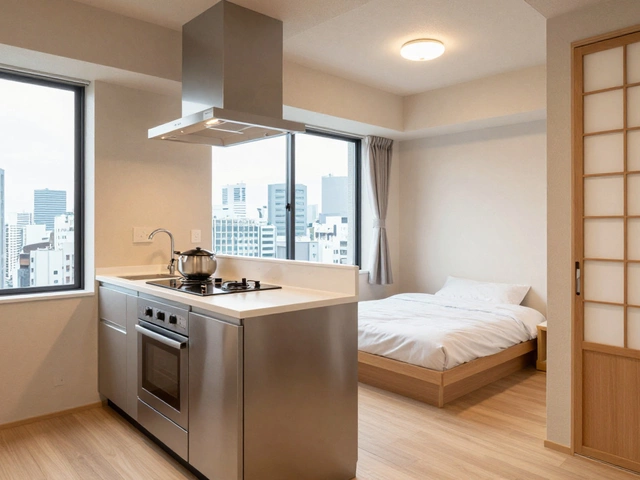Picture this: You find the perfect Boston apartment—sunlight streaming into the kitchen, cool brick walls, and instant visions of your life fitting inside those four walls. That is, until you see the price tag with "broker’s fee" slapped next to it. Suddenly, you’re scrambling to Google: Do I really need to pay a broker’s fee in Boston? Is it just part of the deal or is there a way around it? This isn’t some old-school tradition like clapping when you break a plate at dinner; it’s a real cost that could mean the difference between moving in—or moving on. Buckle up, because if you’re renting in Boston in the summer of 2025, you’ll want to know what you’re really signing up for.
What Exactly Is a Broker’s Fee in Boston?
Let’s start by cutting through the confusion: a broker’s fee is money paid to a real estate agent (the “broker”) for helping you find an apartment to rent. Sounds simple, but in Boston, things get tricky. Unlike some cities where landlords cover the fee, Boston often saddles renters with this extra cost on top of first month’s rent, last month’s rent, and a security deposit. Ouch.
This fee usually ranges from half a month’s rent to a full month’s rent—though every once in a while, you’ll see something upwards of that for high-demand spaces. According to Boston Pads, the average rent for a one-bedroom apartment in Boston hit $2,775 in 2024, making a typical broker’s fee well over $2,000. For many, that’s enough to blow the moving budget. The fee is often non-negotiable and expected up front, before you even crack open a box of pizza in your new place.
Why is it like this here? Boston’s rental scene is powered by brokers. More than 75% of rental listings here are controlled by brokerages, not landlords, so working with a broker isn’t just common—it’s almost a requirement if you aren’t looking for a unicorn “no fee” place. Brokers in Boston do more than show apartments. They process credit checks, write leases, and even act as intermediaries when you want to negotiate terms (or, you know, change that ancient carpet in the living room).
Still, it’s not a law of nature. Unlike in New York City (where broker’s fees were briefly banned for tenants in 2020 before a legal reversal), Massachusetts law doesn’t force either party—landlord or renter—to pay the broker. It just lets them negotiate who pays. In practice, renters shoulder it almost every time. Why? Simply put, landlords have little incentive to cough up the fee when demand for housing in Boston is sky-high year-round, driven in part by universities churning out new renters every semester.
| Year | Average Rent (1BR) | Broker’s Fee (Typical) |
|---|---|---|
| 2022 | $2,500 | $2,250–$2,500 |
| 2023 | $2,650 | $2,325–$2,650 |
| 2024 | $2,775 | $2,400–$2,775 |
One weird quirk? Sometimes, you’ll see “no fee” apartments, but that doesn’t mean the space is necessarily cheaper. In many cases, the landlord pays the broker, and the cost is baked into a slightly higher monthly rent. So whether or not you see a broker’s fee, you might end up paying for it in the long run.
How Broker’s Fees Work: Who Pays and Why?
So here’s the thing—there’s no hard-and-fast law about who pays the broker’s fee in Boston. It’s all about who hires the broker. If you scroll through listings, you’ll see some labeled “fee paid by landlord.” Jackpot! But these are rare finds. Most brokers in Boston sign agreements with landlords, meaning they control the listing and usually expect the incoming tenant to pick up the tab once the deal is signed. If the tenant hires the broker as an agent to see multiple apartments, then the tenant pays, too.
This “custom” isn’t just tradition—it’s built on a classic supply-demand saw. In cities where vacancies are high, landlords are more likely to offer to pay the fee (or split it) just to get bodies in the door. In Boston, where rental vacancy rates hover around a stomach-churning 2%—one of the lowest in the country—landlords don’t have to sweeten the deal. Back in 2022, a study from Zumper showed only about 18% of Boston listings were “no fee.” If you’re lucky enough to spot one, you’ll want to act fast.
- If a landlord signs an exclusive listing agreement with a broker, it’s likely they’ll want tenants to pay the broker’s fee.
- If a landlord is desperate—say, the apartment’s been empty for months—they might pony up. But with demand so high in Boston, don’t count on it in 2025.
- Some big property management companies build broker commissions right into their salaries or operating budgets, effectively creating “no fee” buildings—even if the rent’s a bit higher.
People new to Boston often ask if they can negotiate the fee or if it’s legal to ask the landlord to split it. Of course you can ask, but with so many renters fighting over every listing, most landlords simply move to the next applicant—someone willing to pay up front and without complaint. The fee is usually paid in a certified check or wire transfer right after you sign a lease.
Is it legal to charge these fees? Absolutely. State law just says brokers need to be licensed real estate agents and must disclose the fee up front. There’s nothing stopping landlords or brokers from pocketing big sums—though in some towns around Boston, local ordinances require better transparency on broker’s fee disclosures.
One odd twist: People sometimes ask friends to act as an “unofficial broker,” hoping to skirt the fee. But unless they’ve got a Massachusetts real estate license, that’s a legal no-go. Licenses exist for a reason—plus, without one, you have little recourse if things get shady.

Tips on Finding “No Fee” Apartments in Boston
Let’s cut straight to the chase: scoring a great “no broker fee” apartment is like finding a needle in a haystack…but it’s not impossible. Over time, some smart tenants have figured out a few creative ways to avoid the fee—or at least blunt its impact. If wallets are tight (and whose isn’t?), try these approaches.
- Look for direct-from-owner listings. Landlords who don’t use brokers—think smaller property owners or absentee owners—might post their own ads on sites like Craigslist, Facebook Marketplace, Reddit’s r/BostonHousing, and Zillow. Skip broker apps and filter for “by owner” if the site allows.
- Timing is everything. Try apartment hunting in the winter. Demand drops and landlords may agree to pay part or all of the broker’s fee to move things along.
- Hunt for large managed apartment buildings. They often have in-house leasing agents (not technically brokers), allowing you to avoid that big fee.
- If you’re a student, check bulletin boards at local campuses—professors or staff sometimes rent out rooms or apartments directly and prefer to skip brokers altogether.
- Use word of mouth. Ask around at work, with friends, or through alumni networks. Someone’s always moving, and a little social digging can pay off big.
If you absolutely have to use a broker, ask if they offer rebates (some newer brokerages do), or if not, see if they’ll let you spread the payment over several months. Not all will say yes, but it never hurts to ask—and the worst they can do is say no.
There’s been steady chatter about making broker’s fees illegal for tenants (like in Seattle), but as of June 2025, no such law exists in Massachusetts. Lobbying groups for both sides are pretty active, so this could shift in the coming years—especially as the city fights to stay affordable for regular folks.
Things to Watch: Red Flags and Legal Details
Broker’s fees are a pain, but you want to make sure you’re not being taken for a ride—or breaking the bank for a place that’s not worth it. Here’s some stuff to keep on your radar.
- Brokers must be licensed in Massachusetts. You can look up their names in the state’s license database. Unlicensed middlemen aren’t just sketchy—they’re illegal.
- The maximum broker’s fee is not set by law. If someone tries to charge more than a month’s rent, ask exactly what makes that place so special. Sometimes, it’s simply not justified.
- Get everything in writing. Massachusetts law says the broker must disclose the amount and timing of the fee before you sign a lease.
- Watch for “bait and switch” tactics—photos that don’t match, prices that magically change, or requests for cash payments upfront. If it feels fishy, it probably is.
- If you pay a deposit (to take the apartment off the market), make sure you know whether it’s refundable. And always get a receipt!
Brokers are legally required to disclose any fee structure before collecting. If a broker tries to slip the fee in after you’ve signed or fails to mention it before you commit, you can file a complaint with the Massachusetts Division of Professional Licensure. That’s your little bit of power in a high-stakes game.
One thing to keep in mind: if a broker “shows you a place for fun,” but you end up renting it directly from the landlord later, you might still be on the hook for the fee (if the broker introduced you to the unit). Again, get all your agreements in writing. Landlords and brokers alike prefer tenants who don’t fuss over paperwork, but don’t let that be you.

Should You Ever Pay a Broker’s Fee? Making the Call in 2025
The housing crunch in Boston shows no signs of easing in 2025. Rents keep climbing, new construction can’t keep up, and college students keep cycling in and out—so the broker’s fee, like an annoying cousin, isn’t disappearing soon. If you want the widest range of apartments, working with a broker is still the fastest ticket in. They’ll show you the goods, handle the nitty-gritty, and maybe even catch fraud you wouldn’t see coming.
But should you just accept the fee? Here’s a cheat sheet:
- If it saves you weeks of searching or nets you a rent deal (think: rent-stabilized, well-managed, or with killer amenities), it could be worth it. Do the math—sometimes speed and safety make the fee a decent tradeoff.
- If every dollar matters, prioritize direct-from-owner or managed properties with no fees. Don’t be afraid to walk away; new listings pop up every week, especially at the start and end of semesters.
- If you must pay, use a credit card, money order, or bank check—never give cash.
- Always budget: first and last month’s rent, security deposit, broker’s fee, moving costs. Expect to lay out close to four months of rent upfront for most places.
Remember, Boston’s rental market has its own rules. The best thing you can do is arm yourself with knowledge, plan ahead, and don’t get pressured into paying a broker’s fee for a property you haven’t seen in person or a deal that makes absolutely no sense. In the end, whether you end up paying the broker's fee Boston throws at you—or you find your way around it—the key is knowing the game. Because in Boston, just like landing a good parking spot or finding a pizza place after midnight, every edge counts.





